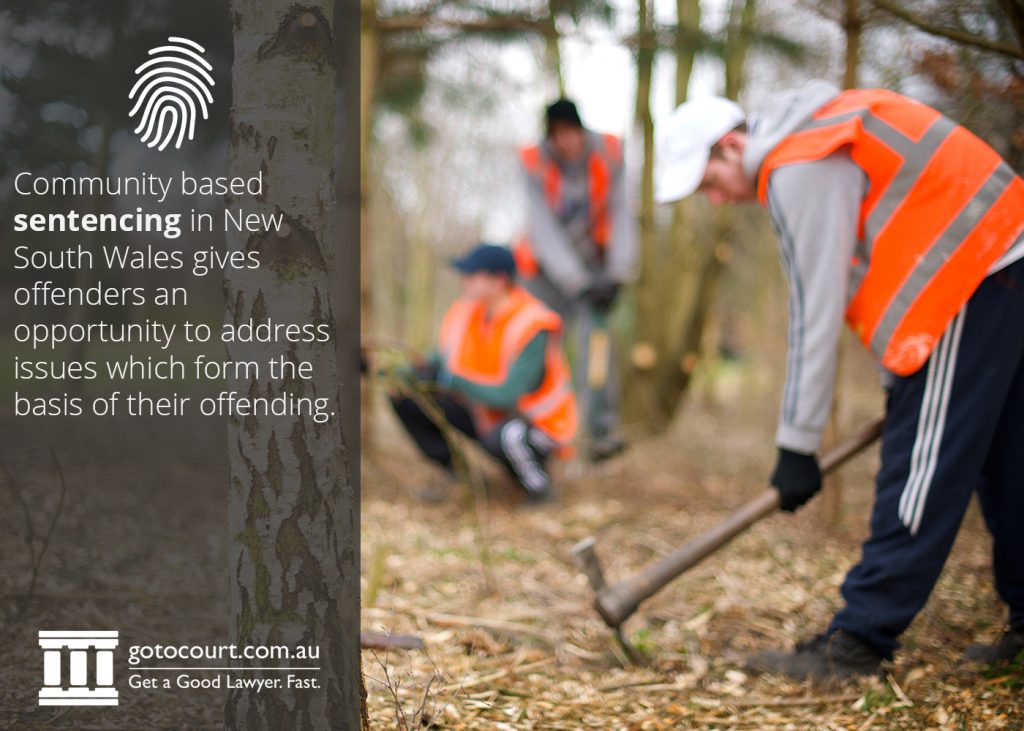Community Based Sentencing in New South Wales
In addition to imprisonment and fines, courts have the option of handing down community based sentences in New South Wales. This article explains what community based sentencing in NSW is, what specific types of community based sentencing there are, and when they become available.
What is a community based sentence in New South Wales?
A community based sentence is a court order that allows offenders to stay out of prison and serve their punishment in the community instead. It differs to a court program which is used primarily as a way for the offender to avoid punishment and address their offending behaviour.
In NSW there are several court programs available, such as the Drug Court of New South Wales which issues treatment programs for people with drug and alcohol problems and Forum Sentencing where the offender and victim meet to discuss repairing the harm done).
A community based sentence gives offenders an opportunity to give back to the community and address the issues which form the basis of their offending. All community based sentences in NSW come with strict conditions which require the offender to do specific things. These include drug and alcohol counselling, report to a supervisor, and regularly see a psychiatrist.

The main legislation responsible for community based sentencing in NSW is the Crimes (Sentencing Procedure) Act 1999 (NSW). However, section 7 of the Crimes (Interstate Transfer of Community Based Sentences) Act 2004 (NSW) provides a useful list of what community based sentences are in NSW. These include the following:
- Home detention orders;
- Intensive correction orders;
- Community service orders;
- Good behaviour bonds;
- Suspended sentences; and
- Extended supervision orders.
When can a community based sentence become available?
Below is a detailed description of each community based sentence, what is involved, and when they become available to an offender.
Home detention orders
A home detention order is a bit like house arrest in the USA. It occurs when the offender is ordered to serve their time in an approved residence.
In order to be eligible for a home detention order, it is essential that the offender has been handed down a maximum sentence of 18 months’ imprisonment and has not committed any offences of a sexual nature. The supervisor will also look at the offender’s criminal history to see if the program is suitable.
If the supervisor gives their approval, the offender will be asked to sign an agreement to abide by strict conditions. Such conditions can involve wearing an electronically monitored anklet, not taking illegal drugs and alcohol, and only leaving the premises for approved activities such as shopping, going to work, and undertaking drug and alcohol counselling. Failure to follow the conditions can lead to the order being taken away and the offender having to serve the rest of their sentence in prison.
Intensive correction orders
An intensive correction order involves the offender being ordered to serve their time under strict conditions in the community. The offender must have been sentenced to a period of two years’ imprisonment or less and no punishment other than prison is possible.
Additionally, the offender must not be guilty of a sexual offence and the supervisor must deem them to be suitable for the program. The offender must also abide by strict conditions such as living in an approved residence, complete a minimum of 32 hours of community service each month, and engage in activities to address their offending behaviour.
Breach of these conditions may result in the offender being ordered to serve the rest of their sentence in prison.
Community service orders
A community service order is an alternative to prison and involves the offender doing voluntary work in the community for up to 500 hours. The courts have the power to make community service orders under the Crimes (Sentencing Procedure) Act 1999 (NSW).
It is generally not given for serious offences, particularly those of a sexual nature. Below is a general list of the number of hours the offender can be expected to work.
| Number of hours | Imprisonment sentence |
| 100 hours | If the sentence is no more than six month’s imprisonment. |
| 200 hours | If the sentence is more than six months’ imprisonment but less than a year. |
| 500 hours | If the sentence is more than a one-year jail term. |
The offender may be ordered to do work such as plant trees, remove graffiti, work with homeless people, or anything else the supervisor deems suitable. There are strict conditions which apply. These include the offender having to sign on and off each day, working no more than eight hours a day, and pulling their weight when working.
Breach of the conditions can lead to the offender having to complete more hours of work or serve a term of imprisonment.
Good behaviour bonds
A good behaviour bond is a period of time when the offender must show good behaviour to avoid jail.
There are three types of good behaviour bonds in NSW:
- A good behaviour bond called a Section 9;
- A Section 10 good behaviour bond; and
- Suspended sentences that are also referred to as Section 12 Bonds.
A Section 9 good behaviour bond last up to five years and a conviction will be recorded. A section 10 good behaviour bond can last up to two years and does not result in a conviction if no breaches have been made throughout the good behaviour period.
A good behaviour bond comes with numerous conditions such as participating in drug and alcohol counselling, staying away from certain people, and reporting to the supervising officer. Failure to follow the conditions may lead to harsher penalties ranging from simple warnings to imprisonment.
Suspended sentences under Section 12
A suspended sentence in NSW is a prison sentence that is put off to allow the offender to serve a period of good behaviour. It is referred to as the most serious of the good behaviour bonds.
It applies only to offenders who have been handed sentenced to a maximum of two years in jail. The offender can still serve time in prison and have part of the prison term suspended. For example, if the sentence is two years in prison the period of imprisonment can be suspended after you serve six months. This means that the offender will be required to serve six months in prison, be released, then have to serve a good behaviour bond of 18 months.
There are strict conditions which apply to suspended sentences and any breach usually results in having to serve the original prison sentence.
Extended supervision orders
Under the Crimes (High Risk Offenders Act) 2006 (NSW), the NSW Attorney-General has the power to use an extended supervision order to keep certain prisoners in jail, even if they have finished their sentence.
These apply only if the offender is a danger to the community and likely to re-offend. If the offender has been released, the order can be used to make sure they abide by strict conditions while in the community. Breach of those conditions automatically results in going back to prison.








